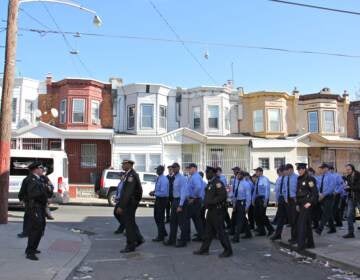After promising increased transparency, Philadelphia is redacting police complaint records
The city says the change is necessary to protect officers' identities — and lets it keep up the pace of publishing despite a staff shortage.

Mayor Jim Kenney (Emma Lee/WHYY)
This article originally appeared on Billy Penn.
—
Years before the public outcry over Philly police officers posting memes on Facebook, Mayor Jim Kenney made a pledge to improve trust in the department. For the first time, the city would publish complaints civilians had lodged against cops.
“Everyone who works for the city of Philadelphia is a public servant, and the public deserves to know we will take their complaints about any city service seriously,” Kenney said in a 2017 statement.
Less than two years later, his administration is walking back that lauded transparency effort.
The department recently began removing identifying information and other details from the complaint database it said was meant to make the department more accountable.
The 2017 release of the information already came with some significant caveats. Both cops and aggrieved civilians were identified only by first and last initials, making it difficult to determine which complaints were associated with which officer. And even the initials were later removed, after city officials learned — likely via reporting on the complaint allegations — that the letters could still be used to identify police in certain cases.
In recent months, the Kenney administration went a step further. Grim or embarrassing allegations have been removed and replaced with a one-sentence summary, rather than a verbatim account.
The rollback is a concern for David Rudovsky, a civil rights attorney who has sued the city and police department numerous times. He says the database should allow the public to identify potential problem officers.
“They’re becoming far too restrictive,” Rudovsky said. “It doesn’t give the public a sufficient amount of information to make judgments about possible misconduct by the police.”
Kenney’s office blamed staffing limitations for the changes, asserting that the city doesn’t have time to include full complaint descriptions going forward if it wants to keep up a regular publishing pace.
“The brevity of the information is simply due to the fact that PPD does not have sufficient staff for the high volume of data entry,” said Kenney spokesperson Mike Dunn. “In other words, this is a compromise between our desire to make these records readily available, and the limitations of staffing.”
At the same time, those limited personnel resources were allocated to summarize thousands of older complaint summaries. Police spokesperson Capt. Sekou Kinebrew said this was an effort to make the records consistent with one another.
“It is most assuredly not an attempt to scrub information,” Kinebrew wrote in an email.
Grisly allegations, erased from public view
Until earlier this year, the complaint database included often vivid details taken right from the complaint reports — many of which were detailed in two Philadelphia Weekly investigations last year.
Here’s an example of a full allegation from 2017, as archived by reporters:
The complainant, TW, 36/B/M, states that he was physically abused by Officers W and G, 17th District. According to the complainant, on 5-24-15, at 10:10 PM, he was riding his bicycle near 20th & Wharton Streets when someone called to him from a car. He continued riding his bicycle and was struck him from behind by the vehicle. The complainant was knocked from the bicycle to the ground. He was then handcuffed and searched by the occupants of the vehicle before being transported to the hospital for treatment by two uniformed officers. The complainant maintains he did not know the operators of the vehicle that knocked him from his bicycle were plainclothes officers. He maintains they did not identify themselves to him as police officers, nor was he arrested or charged with a crime in connection with this incident.
Unlike the vast majority of complaints filed against Philly police, internal affairs found this complaint credible and the officers guilty. Those disciplinary rulings are still published in the online database, but the officers are now only identified by an anonymous ID number, and description has been reduced to a single line:
According to the complainant, on 5-24-15 at 10:10pm, they were physically abused by officers assigned to the 17th District.
Watchdogs say details are important and can be used to track patterns of alleged misconduct among certain officers.
But Kevin Mincey, a criminal defense attorney and partner at law firm Mincey Fitzpatrick Ross, said the stripped down allegations could be a deterrent. He argues victims are emboldened to see they are not alone on the receiving end of misconduct by a certain officer.
“It might discourage some folks from bringing forward another claim,” Mincey said.
Austin Nolen, a law student who advocated to have the initial complaint database published online, also noted that identifying details about the individuals who file complaints have been erased.
Although officials stated this was aimed at protecting privacy, a side effect it’s impossible to determine the race or gender of the people who file most complaints, Nolen observed.
“Police misconduct is not a race-neutral issue,” he said.
Police rank-and-file decried the initial release of the allegations against them. Some even shared their outrage and disappointment with Kenney on social media, according to posts published last month by the attorneys with the Plain View Project. Others joked that it was no big deal.
“They may put my complaints and incident [sic] in chapter book and sell it at Barnes & Noble,” one officer commented on a Facebook post in 2017.
Despite backlash from police, other cities have already gone much further than Philadelphia in releasing disciplinary records. Chicago publishes copious information about officers who have been accused of or committed misconduct, including information about their units, so civilians can monitor for patterns or problems. Local advocates have reported little negative impact on policing there.
“This isn’t secret stuff,” said Rudovsky. “People are free to talk about [complaints] anyway. If I make a complaint to the police, I can go to the press and say ‘John Doe hit me the other day.’”
Past analysis of the disciplinary outcome records has shown only a fraction of civilian complaints are sustained by the department’s internal investigators.
WHYY is your source for fact-based, in-depth journalism and information. As a nonprofit organization, we rely on financial support from readers like you. Please give today.




